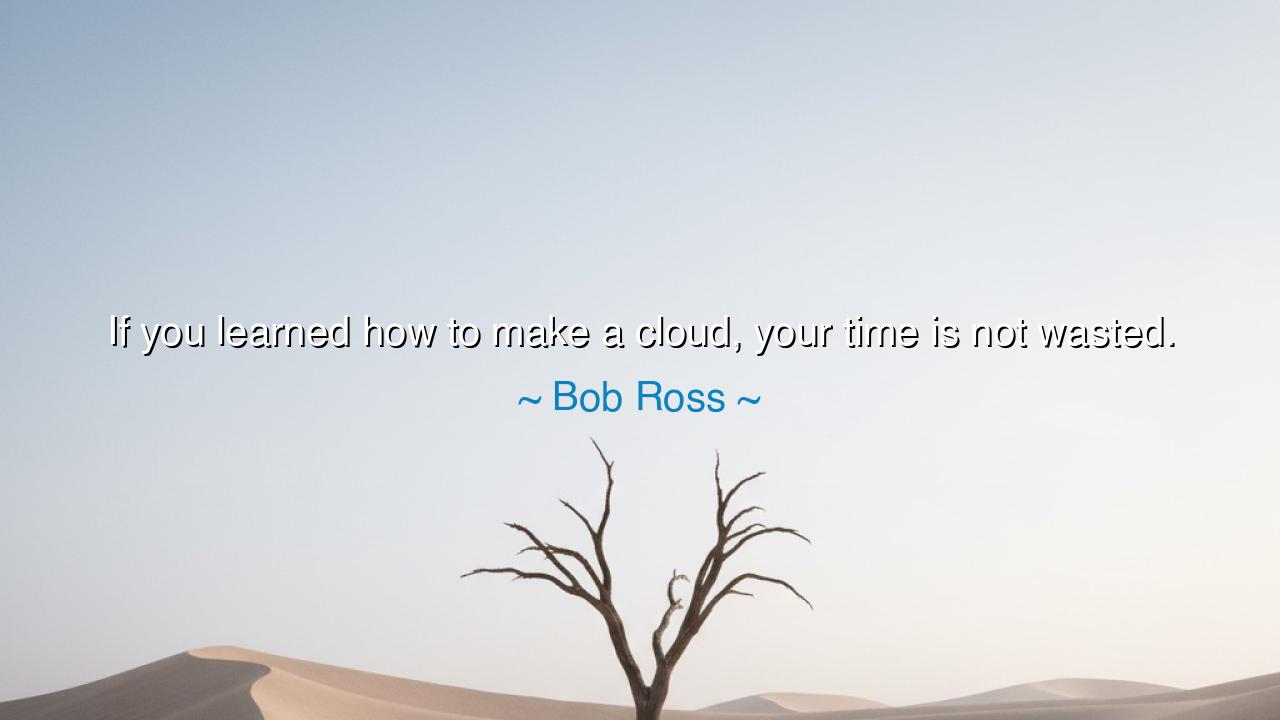
If you learned how to make a cloud, your time is not wasted.






In the words of the gentle painter, Bob Ross, we are told: “If you learned how to make a cloud, your time is not wasted.” Though spoken in the soft cadence of an artist’s teaching, these words carry the weight of a timeless truth. They remind us that no act of learning, no act of creation—however small in the eyes of the world—is ever in vain. The making of a cloud, fleeting, light, and humble, becomes a symbol for all those quiet victories of the spirit that endure within the heart, even when unseen by others.
For in the world of the ancients, wisdom was never measured solely in gold or conquest, but in the cultivation of the soul. To fashion a cloud upon a canvas is to learn patience, observation, and reverence for the subtleties of creation. And though the cloud drifts, ungraspable and without permanence, the discipline and joy discovered in its making remain forever. Thus, Ross’s teaching mirrors the philosophy of old: that the worth of a task lies not always in the grandeur of its result, but in the transformation of the one who labors.
Consider the tale of the great inventor Leonardo da Vinci, who filled his notebooks not only with designs for machines of war and flight but also with sketches of water, plants, and yes, even the delicate swirls of cloud-forms. His contemporaries mocked him at times, for why should a genius waste precious hours drawing the curves of vapor that vanish with the wind? Yet it was through such “waste” that da Vinci sharpened his eye, trained his hand, and cultivated a vision that could see unity in all things. The making of a cloud, then, was no waste, but the silent shaping of genius.
The heart of Ross’s wisdom is that learning itself is never wasted. To learn is to awaken dormant strength within oneself, and to carry forward new ways of seeing the world. One who learns to paint a cloud has not only discovered how to blend colors and soften edges but has also absorbed a lesson in humility: that beauty can be simple, fleeting, and still profoundly worthy. In this sense, every act of creation, no matter how small, nourishes the eternal flame of the soul.
There is also courage in these words. For many are those who despair, thinking their efforts too trivial to matter. They measure their lives against monuments and forget the sacredness of the stone that builds them. Yet Ross reminds us: even the smallest brushstroke has its place; even the humblest cloud has its glory. When a pupil who has failed many times finally discovers the secret of shading light against shadow, their triumph is no less noble than that of a warrior who claims victory in battle.
Let us then take this teaching into our own lives. If you have learned to play a song on a flute, your time is not wasted. If you have discovered how to plant a seed, your time is not wasted. If you have comforted a friend with kind words, though unseen by the world, your time is not wasted. For all these things, like clouds, shape the heavens of your character, and the sky of your spirit becomes brighter with each effort.
The lesson is clear: treasure the small acts of learning, for they accumulate like drops of rain that form rivers. Do not despise the little victories, for they are the stones upon which great temples are built. The practical path is this: set aside each day a moment for humble learning. Practice one new thing, however simple—a line drawn, a poem written, a plant tended, a kindness shown. These are the clouds of your life, fleeting in form but eternal in meaning.
Thus, children of tomorrow, carry this wisdom as you would a lamp through dark valleys: to learn is never to waste time. For even the smallest cloud you paint upon the canvas of your days is proof that your soul is alive, reaching, and becoming more radiant with every breath.






AAdministratorAdministrator
Welcome, honored guests. Please leave a comment, we will respond soon